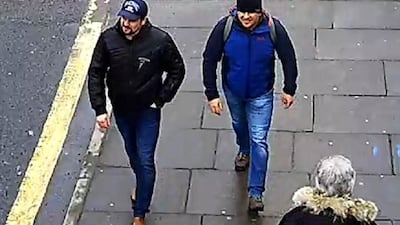Moscow accused the UK government of seeking to unleash anti-Russian hysteria on Thursday as Britain sought backing at the UN Security Council for its conclusion that members of the Russian military intelligence service were behind the nerve agent attack on a former spy.
The emergency session at the UN was called by Britain after prime minister Theresa May named two men from the GRU as suspects for the attack on Sergei Skripal and his daughter Yulia and released footage from security cameras and passports to back up their claims.
Officials announced charges against two alleged Russia agents, Alexander Petrov and Ruslan Boshirov, but said they were likely to be aliases and released the photographs in an attempt to uncover their true identities.
The UK called for greater powers for the Organisation for the Prohibition of Chemical Weapons to attribute blame and sanction nations who breached chemical weapons rules as it outlined the case against the Russian state. It said it would be discussing further measures with its allies.
The meeting started shortly after the release of a joint statement by the leaders of the UK, US, France, Germany and Canada in which they expressed “full confidence” in the British assessment that the suspected hit-team were members of the GRU and the operation was sanction at a “senior government level”.
Britain’s ambassador to the UN, Karen Pierce, claimed that Russia had given 37 different accounts of what might have happened in Salisbury. She said the UK would “respond robustly when our security is threatened” but gave no further details.
______________
Read more:
Novichok poisoning: Russian 'spies' named as suspects in Skripal attack
Chemical weapons watchdog confirms Novichok killed Dawn Sturgess
______________
The threat followed the expulsion of more than 150 Russian embassy staff from 27 countries and Nato following the March attack in the southern English town of Salisbury.
Mr Skripal and his daughter are recovering but a woman, Dawn Sturgess, died after being exposed to the contaminated perfume bottle apparently discarded by the would-be assassins in a Salisbury park after the alleged attack.
Russia claimed that there was nothing new in the UK’s allegations and criticised the UK’s account as a means to “unleash a disgusting anti-Russian hysteria”.
Vasily Nebenzya, the Russian representative to the security council, repeated claims that Russia had been denied access to the recovering victims, and alleged that footage released by the UK had been tampered with. “We have lost all hope of finding the truth of who is guilty,” he said.
The UK received backing from fellow permanent members, France and the United States, which said that the attack in Salisbury had followed a pattern of denials seen over the invasion of Crimea and the downing of flight MH17 in 2014 over the Ukraine.
The spat at the UN came after Britain raised the stakes in its diplomatic battle and accused Russian President Vladimir Putin of having ultimate responsibility for the nerve agent attack on a former spy.
Ben Wallace, the UK’s security minister, said that Mr Putin and his government directed, controlled and funded the GRU.
His comments to the BBC went further than the five-country statement and prime minister Theresa May who on Wednesday told lawmakers that the murder attempt was approved at a “senior level” of the Russian state.
The Kremlin rejected the claims that Mr Putin was responsible and said that it was not going to investigate the suspects. Mr Putin’s spokesman, Dmitry Peskov, said the accusations were unacceptable and claimed that “neither the Russian leadership nor its representatives have anything to do with the events in Salisbury”.
The British government said that the UK would counter Russian “malign activity” with measures reportedly likely to include cyber attacks to disrupt communications and obstructing access to finance.

